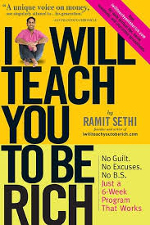Goals are the gateway to financial success
This is the second of a fourteen-part series that explores the core tenets of Get Rich Slowly.

Yesterday I completed my first marathon. It didn't happen exactly as I'd planned, but it happened. Instead of running 26.2 miles, I walked the entire course. Some might view this as a failure. Not me. I'm ecstatic to have finally, at the age of forty, met one of my life-long goals.
Though I had hoped to run the marathon, training injuries the past two years thwarted me. Instead, I walked the Portland Marathon in six hours and 54 minutes. Chris Guillebeau (who wrote The Art of Non-Conformity) walked the first nine miles with me, and Mac joined me for the final 8.2 miles. Though it didn't happen the way I intended, I accomplished my goal.
Pay yourself first: How you can overcome the challenge of saving

One of the oldest rules of personal finance is the simple admonition to pay yourself first. All the money books tell you to do it. All the personal finance blogs say it, too. Even your parents have given you the same advice.
But it's hard. That money could be used someplace else. You could pay the phone bill, could pay down debt, could buy a new DVD player. You've tried once or twice in the past, but it's so easy to forget. You don't keep a budget, so when payday rolls around, the money just finds its way elsewhere.
And besides: What does "pay yourself first" even mean?
Habits of the wealthy: What do rich people do differently?

I'm fascinated by the differences between rich people and poor people. Are the differences mostly a matter of class and economic mobility? Are people born to wealth and poverty and destined to remain there? Or are there observable differences in attitude and action that tend to lead people to specific levels of affluence?
From my experience, it's some of both.
I believe that there are absolutely systemic issues that contribute to wealth and poverty. But I also believe that there are attitudes and habits that foster wealth and success. These attitudes and habits can be learned. They can be applied to our own lives, allowing us to build better futures.
How to Find Great Deals on Vacation and Travel
My wife and I have begun to explore the idea of taking a trip later this year. We're in the preliminary stages of our research and budgeting. Though we aren't ready to book anything yet, it's fun to look at what's available, and to dream of where we might go.
Over the weekend, I polled my followers on Twitter to ask their advice for finding great travel deals. Here are some of the tips and websites they recommended. I'm sure I'll refer to this list often in the coming months.
The power of focus: Why you should tackle one goal at a time

I used to be the sort of guy who loved to have a list of goals. At least once a year -- usually around New Year -- I'd sit down and make a list of all the things that were wrong with me, all of the things I wanted to change.
In 2007, for instance, I made a list of 101 things I wanted to accomplish in 1001 days. (It took me longer than three years to finish that list, by the way. In fact, I still haven't done everything on it because my priorities have changed. But now, ten years later, I see that I have completed nearly all of the ones that still matter.)
Eventually I realized that making a long lists of resolutions is a sure path to disappointment -- at least for me. There's a reason you see newspaper and TV stories every spring about how most people aren't able to maintain the resolutions they set at the first of the year. It's because most of us try to do too much. (And, I think, because we try to set goals that aren't truly aligned with our primary purpose in life.)
Risks That Can Derail Your Retirement
We financial planners and financial writers love to trot out hypothetical illustrations along the lines of “If you save 20% of your income starting at age 40, you'll be able to retire by your late 60s, assuming an 8% rate of return” — a scenario I wrote about in March. While such projections are necessary for planning for the future, the truth is that they will most definitely be wrong once the future rolls around. There are just too many unknowable variables, such as future investment returns, inflation rates, and tax rates.
However, the unknowable unknowns aren't just limited to economic variables, as readers often remind me after I write such an article. Here's a tale a GRS reader told in the comments section after my March post:
In 1996 I had $78,000 in retirement funds and was 32 years old (hubby was 38). Then our home was flooded because a contractor doing a city project made a mistake. While struggling with being unable to live in the house, I was diagnosed with cancer and needed surgery ([we had] no insurance). Within a year I had cashed out the $78,000 to begin rebuilding the house and pay for surgery (we recouped a very small portion of the loss from the contractor). We sold the house and walked away with $11,000 to our name. That was in 1998.
<
Book review: I Will Teach You to Be Rich
Today I am reviewing a new book written by a colleague. As you read this review, please remember that I am friends with author. For comparison, you can see my reviews of two other books by friends here and here.
I'm often asked to recommend personal finance books for young adults. I've read a few (and have more in my to-read stack), but there are only two that I promote in my presentations to students:
- Debt is Slavery by Michael Mihalik, a short book packed with great advice. This is a fantastic overview, but it's light on tactical tips.
- Suze Orman's The Money Book for the Young, Fabulous, and broke has the opposite problem. It's too long. Again, the advice is solid, but there's too much of it.
Now, however, my friend and colleague Ramit Sethi has written a money book aimed squarely at those in their twenties. And he's done a marvelous job. I can only hope that my own (theoretical) book turns out this well.
Is there morality in personal finance?
A while back, my blogger friend and fellow GRS writer Holly Johnson wrote about a healthy dose of lifestyle inflation. In that article, someone made a side point that there shouldn't be morality in personal finance -- it should be about practicality.
Within the comments, there was a brief but interesting dialogue going on about this topic -- morality and personal finance. I thought it was really interesting and worth expanding on more, as it prompted me to give this topic a lot of thought.
I agree that it helps to think of personal finance and frugality in practical, functional terms. What's the investment of this purchase? How much is my time worth? What is the cost/benefit of something?
How to dispute your mechanic bill

This article is by freelance writer Roger White and staff writer April Dykman. It originally appeared on Roger's blog in a different format.
April
As many GRS readers know, last year I quit my job to become a full-time freelancer. The hardest thing about moving on was leaving coworkers like Roger White, a magazine editor and author of the funniest interoffice e-mails ever. Roger and I teamed up to bring you his story about a recent experience paying for an auto repair, along with tactical advice about how to dispute your mechanic bill.
Roger
Our little family was tooling along this year, struggling to stay within our monthly budget while juggling life's big-ticket items—you know: braces, countless teenage daughter items, summer camp fees times number of children squared, etc., etc.—when the two most feared words in all of suburbia's lexicon knocked us flat.
Which new car would you buy?
Last week via email, reader David Hatch asked:
If you were going to buy a new car, what would you get do you think?
I wrote a short email reply...then decide this topic is worth a deeper dive (of only for my own personal edification).
